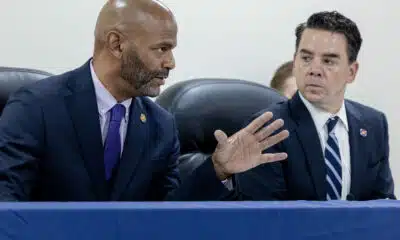Mississippi News
Title IX, 50 years later: The 37 words that changed our sports world
Title IX, 50 years later: The 37 words that changed our sports world
Let’s go back 50 years to 1972. Title IX has just weeks earlier become the law of the land. To paraphrase Bob Dylan: The times, they were a-changin’.
I was a young sports writer at the Hattiesburg American, working my way through college. My editor told me to go report on a seminar at the university. The federal government – the Department of Health, Education and Welfare (HEW), specifically – was sending a representative to explain the ramifications of Title IX. I went.

But first I had to look up the Title IX legislation. It was all of 37 words: “No person in the United States shall, on the basis of sex, be excluded from participation in, be denied the benefits of, or be subjected to discrimination under any educational program or activity receiving Federal financial assistance.”
I didn’t see the words “sports” or “athletics” in the wording anywhere. I wasn’t sure why I was being sent to cover it. The answer came quickly.
The woman from HEW didn’t mince words. She said all public schools – elementary schools through universities that received federal funding – would have to spend money equally on boys and girls and men and women – in athletics, as in every other aspect of education. And, if they didn’t, they would lose all federal monies.
Hands shot up. People had questions. One of the first: How are universities such as USM, Mississippi State and Ole Miss, already struggling to make ends meet, supposed to double their spending on scholarships, salaries, expenses, etc. within their athletic programs?
Her answer: That wasn’t the government’s concern. They’d do it or else.
At that point, I muttered something to the effect: “That’s insane. It’ll never fly. It’s not fair.”
The man next to me, a professor in the health and physical education department, looked at me and replied, “Obviously, you’ve never had a daughter.” He had three. One became the point guard on the first Hattiesburg High basketball team.
Fifty years, a son and a daughter later, I get it.
Last week, the Overby Center for Southern Journalism and Politics at Ole Miss celebrated 50 years of Title IX with a panel discussion that featured Ole Miss athletic director Keith Carter, women’s basketball coach Yolette McPhee-McCuinn (better known as Coach Yo) and Rita Igbokwe, a senior player on the Ole Miss women’s basketball team. I moderated. You can find it here.
If the discussion did nothing else, it surely highlighted the remarkable change in the American sports scene those 37 words have spurred. I’ve lived it. I’ve covered it.
In 1972, no co-ed Mississippi college or university had a single women’s athletic team. Since then, Delta State has won six national women’s basketball championships. Ole Miss has won a national championship in golf. Mississippi State has made it the NCAA women’s basketball championship twice. Southern Miss made the women’s College World Series in softball. In track and field, USM’s Tori Bowie of Pisgah won NCAA championships in track and field and later an Olympic gold medal and three world championships. Last season, Coach Yo’s Ole Miss team won 23 games and made the NCAA Tournament.
More importantly, over the last 50 years, thousands upon thousands of young women have competed in multiple sports and had their educations financed as was never the case before.
In more than half a century of covering Mississippi sports, the two most meaningful transformations I have witnessed: One, the widespread racial integration of sports at all levels; two, the meteoric rise of women’s athletics.
Fifty years ago, I think I would have predicted what has happened as far as integration. As for what has happened with regard to women’s athletics, I had not a clue.
Thirty-seven words. Amazing.
This article first appeared on Mississippi Today and is republished here under a Creative Commons license.
Mississippi News
Suspect in Charlie Kirk assassination believed to have acted alone, says Utah governor
SUMMARY: Tyler Robinson, 22, was arrested for the targeted assassination of conservative activist Charlie Kirk in Orem, Utah. Authorities said Robinson had expressed opposition to Kirk’s views and indicated responsibility after the shooting. The attack occurred during a Turning Point USA event at Utah Valley University, where Kirk was shot once from a rooftop and later died in hospital. Engravings on bullets and chat messages helped link Robinson to the crime, which was captured on grim video. The killing sparked bipartisan condemnation amid rising political violence. President Trump announced Robinson’s arrest and plans to award Kirk the Presidential Medal of Freedom.
The post Suspect in Charlie Kirk assassination believed to have acted alone, says Utah governor appeared first on www.wjtv.com
Mississippi News
Americans mark the 24th anniversary of the 9/11 attacks with emotional ceremonies
SUMMARY: On the 24th anniversary of the 9/11 attacks, solemn ceremonies were held in New York, at the Pentagon, and in Shanksville to honor nearly 3,000 victims. Families shared personal remembrances, emphasizing ongoing grief and the importance of remembrance. Vice President JD Vance postponed his attendance to visit a recently assassinated activist’s family, adding tension to the day. President Trump spoke at the Pentagon, pledging never to forget and awarding the Presidential Medal of Freedom posthumously. The attacks’ global impact reshaped U.S. policy, leading to wars and extensive health care costs for victims. Efforts continue to finalize legal proceedings against the alleged plot mastermind.
The post Americans mark the 24th anniversary of the 9/11 attacks with emotional ceremonies appeared first on www.wcbi.com
Mississippi News
Hunt for Charlie Kirk assassin continues, high-powered rifle recovered
SUMMARY: Charlie Kirk, conservative influencer and Turning Point USA founder, was fatally shot by a sniper during a speech at Utah Valley University on September 10, 2025. The shooter, believed to be a college-aged individual who fired from a rooftop, escaped after the attack. Authorities recovered a high-powered rifle and are reviewing video footage but have not identified the suspect. The shooting highlighted growing political violence in the U.S. and sparked bipartisan condemnation. Kirk, a Trump ally, was praised by political leaders, including Trump, who called him a “martyr for truth.” The university was closed and security heightened following the incident.
The post Hunt for Charlie Kirk assassin continues, high-powered rifle recovered appeared first on www.wjtv.com
-
News from the South - West Virginia News Feed7 days ago
Protesters in D.C. flood the streets demanding an end to Trump’s military deployment
-
News from the South - Virginia News Feed7 days ago
On the record: Winsome Earle-Sears
-
News from the South - Missouri News Feed6 days ago
1587 Prime gives first look at food, cocktail menu ahead of grand opening in KC
-
News from the South - Arkansas News Feed6 days ago
‘One Pill Can Kill’ program aims to reduce opioid drug overdose
-
Mississippi News Video6 days ago
Interview: Come see Baptist at WTVA Senior Health Fair
-
News from the South - Alabama News Feed6 days ago
Alabama lawmaker revives bill to allow chaplains in public schools
-
The Conversation7 days ago
How is paint made?
-
News from the South - Arkansas News Feed6 days ago
Arkansas’s morning headlines | Sept. 9, 2025

















































